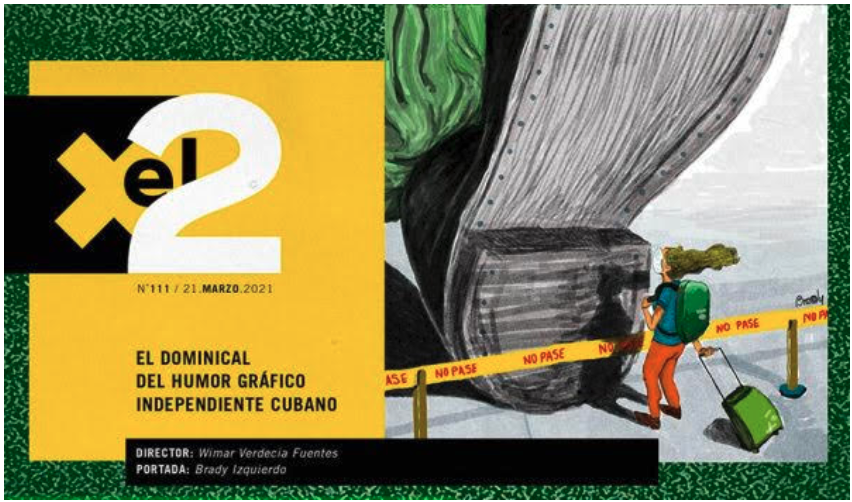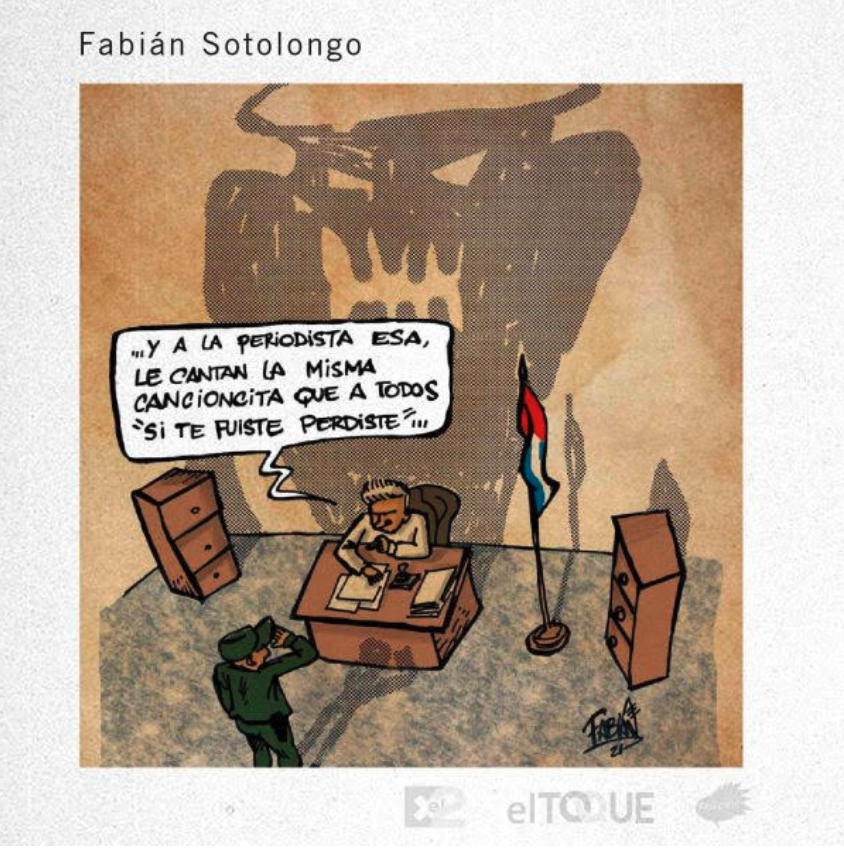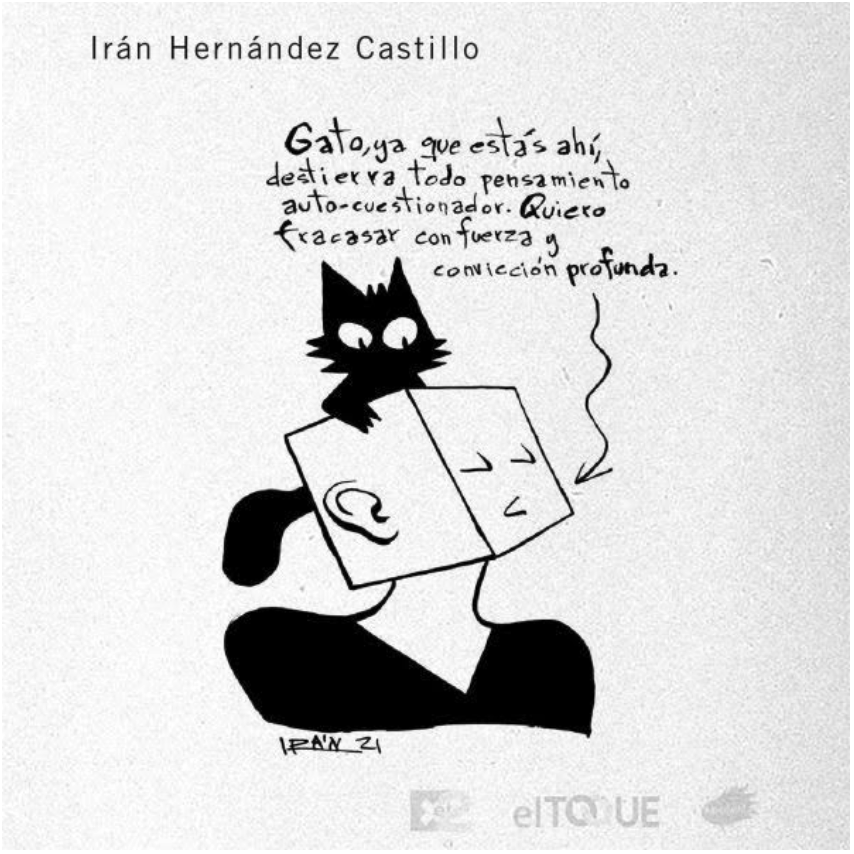“Karla Pérez González is being prevented from returning to her own country, and to her family, because the Cuban government believes it is acceptable to banish Cubans who criticize them,” said Karin Deutsch Karlekar, director of free expression at risk programs at PEN America. Karla, an independent Cuban journalist and recent college graduate, was stranded in Panama the week of March 19, 2021 after being notified by Havana that she had been banned from returning to her country. She is 22 years old, but this is not her first encounter with the Castro regime's repressive apparatus.
Cuban national Karla Pérez González not allowed by the Castro regime to return to Cuba
In April 2017 when she was an 18-year-old college student in Cuba Karla was "accused of having contacts with the Somos+ (We Are More) Movement and publishing on digital sites critical of the government." This was the grounds claimed for her expulsion from school because according to the Federation of University Students (FEU), “[i]n our universities professionals must be trained who are ever more competent and committed to the Revolution.” Education is not free in Cuba, but subordinated to the demands of a 62 year old dictatorship.
Thanks to journalist Mauricio Muñoz in (the Costa Rican daily) El Mundo she was able to start an internship in Costa Rica in May 2017, and eventually resume her studies in journalism in the Universidad Latina in San Jose, Costa Rica. She completed her studies and graduated in December 2020. Cuban officials allowed her to obtain a valid passport, and pay all the fees to be able to return home with all the proper documents. She boarded her flight, and all appeared fine until her layover in Panama, when Cuban officials informed her that she had been "regulated" and could not return to Cuba.
Cuban spy calls for prosecution of 22 year old journalist and recent college graduate for her writings
Mr. Rene Gonzalez (no relation), a Cuban spy jailed in the US for 13 years for taking part in "active measures" on U.S. soil, and was part of a spy network linked to a terrorist action that killed four, argued on his Facebook page on March 20, 2021 that she should be allowed to return to Cuba, but then put on trial for her writings.
This is not an isolated case.
Between 70,000 and 300,000 Cubans are banned by the Castro regime from returning to their homeland reported The Miami Herald on August 15, 2011 in the article titled "Many Cuban expatriates can't go home again". Despite claims made by both Havana and Washington in 2013 that the Cuban government had liberalized travel to the island, the cases of cruel family separations remained a constant.
In August 2013, Cuban national Blanca Reyes, the representative of the Ladies in White in Europe, complained "that Havana had denied her permission to travel to her homeland and visit her blind, 93-year-old father." Nor was she allowed to see him two months later when he fractured his hip in October 2013, or attend his funeral after he died on October 15, 2013. She had not been able to see her father in nine years because of the regime in Havana, and despite a supposed opening trumpeted in the press at the time.
Blanca Reyes denied the right to return to see her dying father in 2013
Following the Obama Administration's normalization of diplomatic relations with Havana, and his state visit in March 2016 the response from the Cuban government on both the human rights and trade fronts worsened.
Between 1977 and 2015 the U.S. Interests Section in Havana, despite harassment by the secret police, was able to operate without injuries to American diplomats. The Interests section was re-designated an embassy in 2015, and within a year things changed for the worse. A new phenomenon not seen before emerged in November 2016: U.S. diplomats suffering mysterious brain injuries, and no one had (or has) good answers as to what was going on. This led to the shuttering of the U.S. Embassy and the visa office. This has created difficulties for Cubans to see their loved ones and are protesting the closure. However, it is the responsibility of the Cuban government to protect diplomats on their territory, and it appears that they have failed in that duty creating the present situation.
These are the root causes behind the family separations that few are requesting an end to on either side of the Florida Straits, because after 62 years too many have normalized this abnormal regime operating in Cuba.
Cuban families are suffering due to needless separations, but Havana is attempting to spin the blame on the United States, when it is the Castro regime that has the decades long record of separating families, and has failed to protect U.S. diplomats necessitating the evacuation of personnel for their safety. Finally, as the case of Karla Pérez González demonstrates, the Castro regime's idea of citizenship runs afoul of basic international standards, and needs to be condemned.
The plight of Karla Pérez González should clear up any doubts that freedom of expression (Article 19 UDHR), the right to leave and return to your country ( Article 13 UDHR), and the right to an education (Article 26 UDHR) are not recognized as fundamental rights by the Cuban dictatorship, but privileges to be given or taken away depending on the whims of Cuban officials.
Pen America, March 19, 2021
Cuban Government Bans Journalist From Returning Home
Cuban journalist Karla Pérez González was stranded in Panama this week after being notified that her government had banned her from re-entry to Cuba
March 19, 2021
**PEN America experts are available for interviews in English and Spanish//Los expertos de PEN América están disponibles para entrevistas en inglés y español.**
(New York, NY) — Cuban journalist Karla Pérez González was stranded in Panama this week after being notified that her government had banned her from re-entry to Cuba, despite meeting travel requirements and having the correct paperwork. In a statement today, PEN America decried the decision as a politically-motivated and repressive effort to exile the journalist, and demanded that authorities allow Pérez González to safely return to her country.
“Karla Pérez González is being prevented from returning to her own country, and to her family, because the Cuban government believes it is acceptable to banish Cubans who criticize them,” said Karin Deutsch Karlekar, director of free expression at risk programs at PEN America. “Pérez González’s case is another stark example of the alarming lengths that the Cuban authorities will take to silence and punish their critics. We call on the government to immediately lift Pérez González’s entry ban and allow her to go home.”
“Pérez González has been away from friends and family for four years because of an undaunted commitment to expressing her views,” said Julie Trebault, director of the Artists at Risk Connection (ARC) at PEN America. “First her studies were interrupted, and now her entire life has been thrown into tumult because the Cuban government has decided that opposing viewpoints have no place in their country. This type of ideological exclusion is anathema to the free flow of ideas, to cultural exchange, and to freedom of expression.”
Pérez González had been finishing her journalism studies at the University of Costa Rica after having been expelled from studying journalism at the University of Las Villas in Santa Clara after she began to write for Somos +, an opposition blog. In Costa Rica, Pérez González was an intern at El Mundo and occasionally wrote for the ADN Cuba portal, another outlet critical of the Cuban government. After she concluded her studies and her visa expired, Pérez González intended to return to Cuba, flying on Thursday to Panama on a connecting flight, but she was notified there that the Cuban government was prohibiting her from entering the island. She has reportedly been forced to seek asylum in Costa Rica.
Journalists, writers, artists, and activists who express criticism of the ruling regime in Cuba have faced particularly heightened dangers in recent years. In recent months, PEN America has condemned the multiple arrests of Cuban writer Jorge Olivera Castillo and human rights activist Nancy Alfaya, as well as the government’s increasingly brutal efforts to suppress the artistic collective the San Ysidro Movement.
PEN America leads the Artists at Risk Connection (ARC), a program dedicated to assisting imperiled artists and fortifying the field of organizations that support them. ARC recently released A Safety Guide For Artists, a resource that offers practical strategies to help artists understand, navigate, and overcome risk, and features an interview with Cuban artist Tania Bruguera about the state of free expression on the island. If you or someone you know is an artist at risk, contact ARC.
https://pen.org/press-release/cuban-government-bans-journalist-from-returning-home/
Havana Times, March 22, 2021
No Admittance to Cuba (Cartoon feature)
March 22, 2021
Cover design: Janet Aguilar.
By Xel2 (El Toque)
HAVANA TIMES – Some of you are aware of the events that occurred this past week with Cuban journalist Karla María Perez Gonzalez. She was arbitrarily denied entry to her country after being forced to study her career abroad. These types of violations of the rule of law, proclaimed by our constitution, only expose the rusty gears with which our system operates.
The Foreign Ministry gave a press conference to justify the prohibition. Between an obvious manipulation of the information, habitual accusations of a media show and soft blows, they wanted us to believe that a young journalism graduate constitutes a threat to our national security.
This is not an isolated case; it shows to what extent Cubans rights are violated. Political discrimination exercised against those who do not coincide with the party/government line.
Apparently, journalism done outside of official institutions and divergent ideas are like garlic and crucifixes for a certain class of vampires.
Wimar Verdecia Fuentes
…as for this journalist, sing her the same song we always use. “If you left, you lost”…
Cuban animal farm
Cat, since you are up there, bury every questioning thought. I want to fail with strength and profound conviction.
CUSTOMS: Let’s see which category you fall under… Problematic, dissident, ideological deviant, desertor, stateless, worm, mule, artist without a license
Repugnant realism
“We have no problem in having relations with those who think differently from us.”
CUBAN “WORMS” we reserve the right of admission.
https://havanatimes.org/opinion/no-admittance-cartoon-feature/
From the Archives
14ymedio, April 15, 2017
“The Student Body Will Never Accept The Counterrevolution”
18-year-old journalism student, Karla Pérez González, was expelled from Marta Abreu University of Santa Clara for “political reasons”. (Courtesy)
14ymedio, Havana, 15 April 2017 — A statement signed by the Council of the University Student Federation (FEU) of ‘Marta Abreu’ Central University of Las Villas ratified the expulsion of student Karla Pérez González from the journalism department. “The university students will never accept the counterrevolution within our universities,” says the text published Friday.
The statement came to light in the midst of a flood of criticism over the expulsion of an 18-year-old student who is accused of having contacts with the Somos+ (We Are More) Movement and publishing on digital sites critical of the government. “In our universities professionals must be trained who are ever more competent and committed to the Revolution,” argues the FEU.
The statement dusted off the “Words to the Intellectuals” – delivered by Fidel Castro in June of 1961 in the National Library and which have served as the basis for the government’s cultural policy – and said that the student “acknowledges being a member of an illegal and counterrevolutionary organization, contrary the principles, objectives and values of the Cuban Revolution.”
“Within the Revolution, everything; against the Revolution, nothing. Because the Revolution also has its rights; and the first right of the Revolution is the right to exist. And no one can stand against the right of the Revolution to be and to exist,” writes the FEU, quoting Fidel’s speech.
Perez Gonzalez told this newspaper about the sequence of meetings that led to her expulsion. “I was also accused of manipulating my friends and having a strategy from the beginning of the course to subvert the young.”
The statement from the Federation lists two main points of the organization’s actions, controlled for decades by the ruling party. “The defense of our José Marti inspired, Marxist-Leninist, socialist and anti-imperialist process will always be the first task of university students,” and “every brigade will be an impregnable stronghold against any enemy of the work that we Cubans raise our flag for.”
The statement ends with a “Revolutionarily” and does not include the names of the members of the FEU Council that drew it up.
Pérez González plans to “write a letter to the Minister of Education and to denounce what happened to organizations that watch over Human Rights,” to denounce her expulsion.
https://translatingcuba.com/the-student-body-will-never-accept-the-counterrevolution/
EFE, August 14, 2013
Cuba Denies Entry to Representative of Ladies in White in Europe
Blanca Reyes, denied entry into Cuba to see her dying father
MADRID – Cuban Blanca Reyes, the representative of the Ladies in White in Europe, complained Wednesday that Havana had denied her permission to travel to her homeland and visit her blind, 93-year-old father.
In remarks to Efe, Reyes, the wife of exiled Cuban poet and journalist Raul Rivero, who lives in Spain, expressed “the desolation” the denial caused within her given that it is quite likely the last time that she can return home to see her father.
“It’s a human rights violation,” she said, adding that “it’s very unfair that I cannot go to see my father, that I can’t visit my country, my friends.”
“I’m not going to accept that the Cuban government can tell me what I have to do,” the Ladies in White rep emphasized.
“It’s a lie” that the Cuban government is in the midst of opening the country up, she said, adding that the European Union should not relax its Common Position, according to which it demands that Havana make advances in human rights in exchange for reductions in the restrictions it imposes on the island.
Reyes in April accompanied Ladies in White spokesperson Berta Soler to receive the European Parliament’s Sakharov Prize.
The award was given to the group in 2005 but until this year Cuban authorities had not allowed Soler to leave the country.
In 2012, the Spanish government granted citizenship to Rivero, Reyes and their daughter Yenia.
Rivero was sentenced to 20 years behind bars by the Cuban government in 2000 “for practicing independent journalism and expressing his opinions about the Cuban reality,” according to what the Spanish government said upon granting him citizenship. EFE
http://www.laht.com/article.asp?ArticleId=944704&CategoryId=14510













